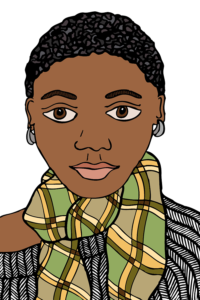I haven’t grown accustomed to being my body. I’m in it, and I exist, but often only in theory so that I find myself glancing at windows while walking down the street, just to make sure I haven’t grown a second nose or butterfly wings. Others seem more at home on or in my body than I do, and when I’m complimented for my appearance I take it as empirical fact, but the only part of me I’m sure exists the way I believe it to is my mind, if only because I don’t have to remind myself to think the way I must remind myself to live. Living in the world as a walking edifice onto which others may project their fears and desires. Some may call it a lack of self-awareness but no, I’d call it more a callous disregard, seeing as such absenteeism requires a certain degree of command over one’s experience. But this was a utility acquired through age and, while I currently maintain control ever-so slightly, there was a time when I did lack self-perception, so much so that you could argue I was barely there at all.
When I was 15, I, like too many girls, had a boyfriend three years my senior. There were three older men, in fact, all in succession, including one 20-year-old in the middle. I hadn’t considered the age gap odd because you never did, not when he was tall and dark and extended himself to you. At the time, I harbored no pretenses of appearing older; that would come later. I attached myself to them for the same reason I attached myself to friends, jobs, hobbies, interests: They happened to be right in front of me.

I met all three of them at a youth ministry based in Arbutus. We’d meet every Thursday night, at a small office renovated into a clubhouse designed to emanate virility: bright orange walls, faux suede bean-bag chairs, a snack table covered in Doritos and Oreos, and a wide-screen TV equipped with an Xbox Kinect for game nights. Matt led the meetings, his sallow skin betraying the bubbly disposition underneath. The meetings were held under the veneer of Christianity but dispersed throughout ostensibly secular lessons on morality, interpersonal communication, and growth. The first boy was a tall, sturdy eighteen-year-old with a sharp jawline and a pair of glasses, but my recollection of him is about as quick and adrift as our relationship.
I asked a friend who he was; in response she only said “You guys should date.” It was my first day at the clubhouse and buoyancy filled the room like a noxious gas. The boy had established himself as an alpha, opening discussions and controlling each interaction with banter: He’d ask a question pertaining to morality, someone would raise their hand and offer a response, he’d follow up their response with a joke, we laughed. But all that mattered to me was his height. Standing at 6’2”, he seemed the perfect type to fall into the way girls would in the grungy stock photos of yore, in which love was whatever looked good on film. When we’re young we have a preoccupation with aesthetics since we only internalize what’s hurt us to the point where, suddenly, social slights knock us over like a pile of pebbles in a low breeze. Images are easy to project ourselves onto—we’re taught to do so, after all—but it’s a bit harder to describe what’s on the inside, especially when we misconstrue our detachment as a vacancy, rather than a conscious subduing of pain.
The rest of our relationship passed by in flashes: holding hands on the way to the church sky trip, seeing a $5 Pixar movie at the Hollywood Theatre, splitting a Hawaiian pizza at Ledo’s, breaking up over text message in the middle of music class. We’d spent an entire three months flittering the time away, and despite the extent to which I’ve forgotten our dates, by the end I thought it’d meant everything. Such is the weight teenaged girls ascribe the lightest things in the world.
I think of Shoshanna Guss. A winsome young New Yorker, she was approached by Jerry Seinfeld towards the end of her senior year at Nightingale-Bamford School, and the two would go on to date until her college graduation when she, presumably, finally emerged as a woman. If a relationship could ever be summed up in a quote, it’d be this: “I am not an idiot. Shoshanna is a person, not an age. She is extremely bright. She’s funny, sharp, very alert. We just get along. You can hear the click,” Jerry Seinfeld told People in March of 1994. You see, Seinfeld’s attraction to her had nothing to do with her pore-less skin, dark beach waves, or curvy physique. He recognized her as a person, and that’s all she wanted. That’s all any of us wanted.
As young girls, so many of us search for men to recognize the humanity—the womanhood—inside us, rather than relegate us to accessories, complements, status symbols. We search for someone to validate the burgeoning intellectual and adventuress inside us all, as Sarah Nicole Prickett once described in Hazlitt:
I know that at 21 I fell in love with someone who was older, who was in fact my teacher, and who seemed as tragic and damaged and inaccessible to me as Max de Winter did to this girl with the “lovely and unusual name.” Like de Winter, he had an ex who was older and, I assumed, hotter and more stylish and way more sophisticated than me. Even when told she was a bartender who read self-help books, I embellished the hearsay by hand. Probably she had learned to bartend while on vacaaaayyyy in, I didn’t know, Tangiers. Maybe by self-help she meant like Barthes.
Whenever a relationship deemed inappropriate finds itself in the limelight, a discussion about consent arises—namely, whether the young one can consent to their situation. The answer? No, not really, because we haven’t yet become whole, and they who claim that we’ve reached completion before even reaching university are incomplete themselves.
To this day, I can only barely recall the boy’s face and can’t remember his last name. It was something quotidian, starting with a J: Johnson or Jackson or Jefferson, nice and easy like that. I suppose that’s the benefit of never having slept with him. The only impression he left was that tingling sensation—even if wholly unfounded—of being seen.
Kaila Philo writes a monthly column of dispatches from the urgency of life. She currently lives in chaos.
This post may contain affiliate links.







